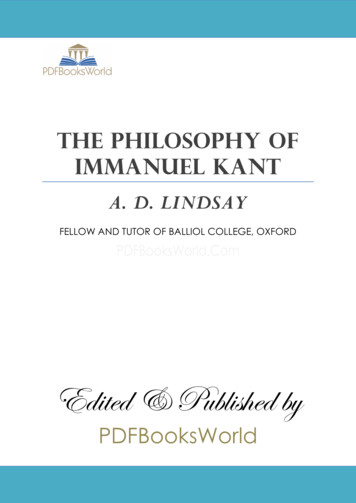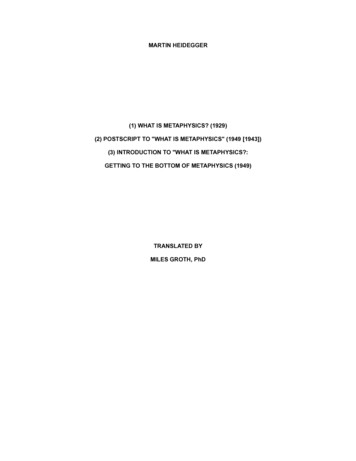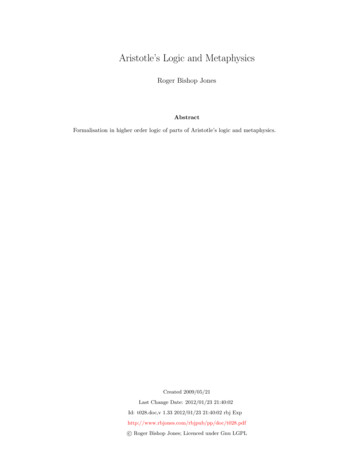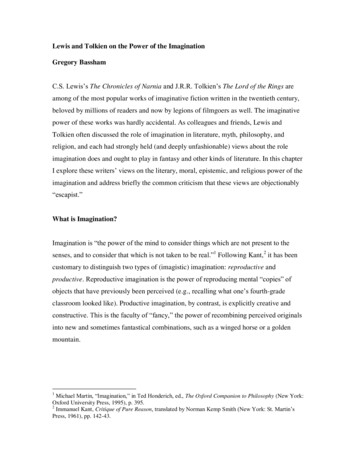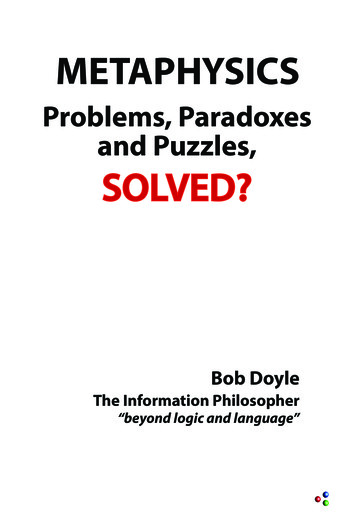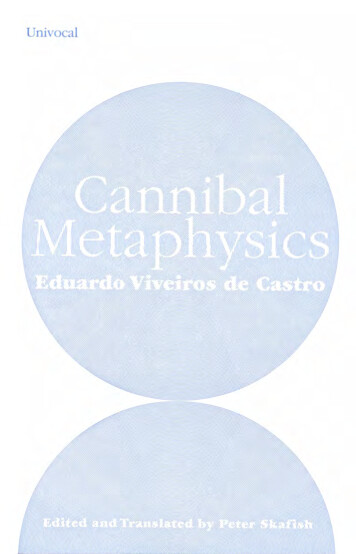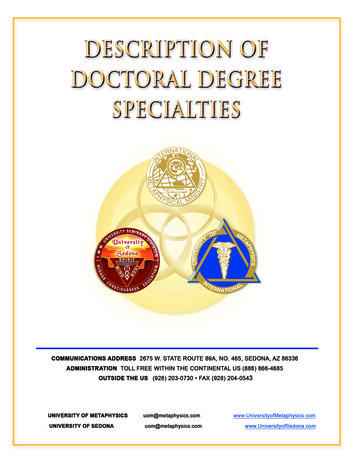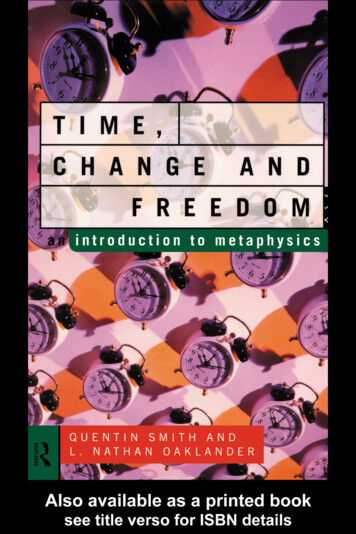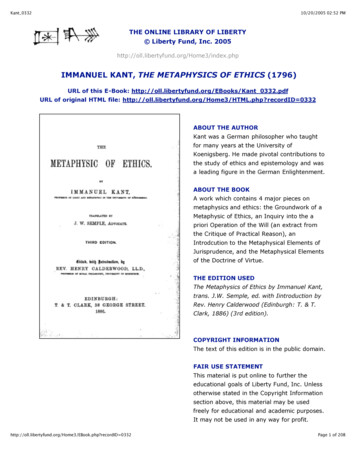
Transcription
Kant 033210/20/2005 02:52 PMTHE ONLINE LIBRARY OF LIBERTY Liberty Fund, Inc. NUEL KANT, THE METAPHYSICS OF ETHICS (1796)URL of this E-Book: http://oll.libertyfund.org/EBooks/Kant 0332.pdfURL of original HTML file: http://oll.libertyfund.org/Home3/HTML.php?recordID 0332ABOUT THE AUTHORKant was a German philosopher who taughtfor many years at the University ofKoenigsberg. He made pivotal contributions tothe study of ethics and epistemology and wasa leading figure in the German Enlightenment.ABOUT THE BOOKA work which contains 4 major pieces onmetaphysics and ethics: the Groundwork of aMetaphysic of Ethics, an Inquiry into the apriori Operation of the Will (an extract fromthe Critique of Practical Reason), anIntrodcution to the Metaphysical Elements ofJurisprudence, and the Metaphysical Elementsof the Doctrine of Virtue.THE EDITION USEDThe Metaphysics of Ethics by Immanuel Kant,trans. J.W. Semple, ed. with Iintroduction byRev. Henry Calderwood (Edinburgh: T. & T.Clark, 1886) (3rd edition).COPYRIGHT INFORMATIONThe text of this edition is in the public domain.FAIR USE STATEMENTThis material is put online to further theeducational goals of Liberty Fund, Inc. Unlessotherwise stated in the Copyright Informationsection above, this material may be usedfreely for educational and academic purposes.It may not be used in any way for recordID 0332Page 1 of 208
Kant 033210/20/2005 02:52 PMTABLE OF CONTENTSLIST OF WORKS COMPRISING KANT’S SYSTEM.EndnotesPREFACE TO THE THIRD EDITION.INTRODUCTION.I.II.CHARACTER OF KANT’S ETHICAL WRITINGS.III.CONTENTS OF THE PRESENT VOLUME.IV.KANT’S PLACE IN THE HISTORY OF PHILOSOPHY.V.VI.BOOK I.STRUCTURE OF KANT’S PHILOSOPHY.QUESTIONS SUGGESTED BY THE WRITINGS OF KANT.PLAN OF STUDY FOR THIS VOLUME.GROUNDWORK OF THE METAPHYSIC OF ETHICS.CHAPTER I.TRANSIT FROM THE COMMON POPULAR NOTIONS OF MORALITY TOTHE PHILOSOPHICAL.CHAPTER II.TRANSIT FROM COMMON MORAL PHILOSOPHY TO THE METAPHYSICOF ETHICS.Autonomy of Will is the Supreme Principle of Morality.CHAPTER III.TRANSIT FROM THE METAPHYSIC OF ETHICS TO AN INQUIRY INTOTHE À PRIORI OPERATIONS OF THE WILL.The Idea Freedom explains that of Autonomy of Will.Freedom must be postulated as a Property of the Will of every Intelligentwhatsoever.Of the Interest indissolubly connected with the Idea of Morality.How is a Categorical Imperative possible?Of the Extreme Verge of all Practical Philosophy.Conclusion of the Groundwork.EndnotesBOOK II.INQUIRY INTO THE À PRIORI OPERATIONS OF THE WILL.(Extracted from the “Critik of Practical Reason.”)CHAPTER I.ANALYTIC OF PRINCIPLES.Remark.SE C . 2.—PO SI T I O N I.Remarks.SE C . 3.—PO SI T I O N II.Remark I.Remark rdID 0332Page 2 of 208
Kant 033210/20/2005 02:52 PMSE C . 4.—PO SI T I O N III.Remark.SE C . 5.—PRO BL E M I.SE C . 6.—PRO BL E M II.Remark.SE C . 7.—FU N D A M E N T A LLA W O FRE A SO N .Remark.Remark.SE C . 8.—PO SI T I O N IV.Remark I.Remark II.CHAPTER II.ON THE À PRIORI SPRING OF THE WILL.CHAPTER III.DILUCIDATION OF THE FOREGOING ANALYTIC.—ON FREEDOM ANDNECESSITY.EndnotesBOOK III.INTRODUCTION TO THE METAPHYSICAL ELEMENTS OF JURISPRUDENCE.PREFACE.INTRODUCTION TO THE METAPHYSIC OF ETHICS.I.—OF THE RELATION SUBSISTING BETWIXT THE POWERS OF THEHUMAN MIND AND THE MORAL LAW.II.—ON THE IDEA AND THE NECESSITY OF HAVING A METAPHYSIC OFETHICS.III.—OF THE DIVISION OF A SYSTEM OF THE METAPHYSIC OFETHICS.IV.—PRELIMINARY IDEAS ENTERING INTO THE METAPHYSIC OFETHICS.(Philosophia practica universalis.)INTRODUCTION TO THE METAPHYSIC OF LAW.SEC. A.—WHAT THE SCIENCE OF LAW IS.SEC. B.—WHAT IS LAW?SEC. C.—SUPREME PRINCIPLE OF LAW.SEC. D.—LAW CARRIES WITH IT A TITLE OF CO-ACTION.SEC. E. —LAW MAY LIKEWISE BE STRICTLY DEFINED AS THAT BYWHICH MUTUAL CO-ACTION IS MADE CONSISTENT WITH UNIVERSALFREEDOM.APPENDIX TO THE INTRODUCTION.OF LAW EQUIVOCAL.I.—II.—EQUITY.NECESSITY.GENERAL DIVISION OF JURISPRUDENCE.A.—DIVISION OF JURIDICAL OFFICES.B.—DIVISION OF recordID 0332Page 3 of 208
Kant 033210/20/2005 02:52 PMThere is but one Birthright, Freedom.FUNDAMENTAL DIVISION OF THE METAPHYSIC OF ETHICS.EndnotesBOOK IV.THE METAPHYSICAL ELEMENTS OF THE DOCTRINE OF VIRTUE.INTRODUCTION.I.—EXPOSITION OF THE NOTION “VIRTUE.”II.—EXPOSITION OF THE NOTION OF AN END WHICH IS AT THE SAMETIME A DUTY.III.—OF THE GROUND UPON WHICH MAN REPRESENTS TO HIMSELFAN END WHICH IS AT THE SAME TIME A DUTY.IV.—WHAT ENDS THEY ARE, THE VERY ESSENCE WHEREOF IT IS TOBE DUTIES.V.—EXPLANATION OF THESE TWO NOTIONS.VI.—(a.)One’s own Perfection.(b.)My Neighbour’s Happiness.MORALS CONTAIN NO LAW FOR ACTIONS (THAT WEREJURISPRUDENCE), BUT ONLY FOR THE MAXIMS WHENCE ACTIONS TAKETHEIR RISE.VII.—MORAL DUTY IS OF INDETERMINATE OBLIGATION, BUT THEJURIDICAL OFFICES ARE STRICT.VIII.—EXPOSITION OF THE MORAL DUTIES AS DUTIES OFINDETERMINATE OBLIGATION.IX.—X.—1.My own Perfection, as End and Duty.2.My Neighbour’s Happiness as End and Duty.WHAT A MORAL DUTY (OR VIRTUOUS OFFICE) IS.THE SUPREME PRINCIPLE OF LAW WAS ANALYTIC—THAT OFMORALS IS SYNTHETIC.XI.—XII.—TABLE OF MORAL DUTIES.PREREQUISITES TOWARDS CONSTITUTING MAN A MORALAGENT.XIII.—GENERAL PRINCIPLES OF THE METAPHYSIC OF ETHICS FORTHE CONSTRUCTION OF A PURE MORAL PHILOSOPHY.XIV.—XV.—OF VIRTUE IN GENERE.OF THE PRINCIPLE DISTINGUISHING BETWIXT MORALS ANDLAW.Of Virtue according to the Principles of Inward Freedom.XVI.—VIRTUE, SO FAR AS IT IS BASED UPON A PRINCIPLE OFINWARD FREEDOM, DEMANDS, FIRST (POSITIVELY), MAN’S SELFCOMMAND.XVII.—VIRTUE, AS BASED ON A PRINCIPLE OF INWARD FREEDOM,DEMANDS, SECOND (i.e., NEGATIVELY), APATHY, CONSIDERED ASFORCE OF cordID 0332Page 4 of 208
Kant 033210/20/2005 02:52 PMXVIII.—PRELIMINARY. OF THE SUBDIVISION OF MORALS.ELEMENTOLOGY OF ETHICS.OF THE DUTIES OWED BY MAN TO HIMSELF.INTRODUCTION.PART I.OF THE DUTIES OF PERFECT AND DETERMINATE OBLIGATION.CHAPTER I.OF THE DUTY OWED BY MANKIND TO HIMSELFIN RESPECT OF HIS ANIMAL PART.CHAPTER II.OF THE DUTY OWED BY MAN TO HIMSELF, ASA MORAL BEING SINGLY.CHAPTER III.OF THE DUTY OWED BY MAN TO HIMSELF ASHIS OWN JUDGE.EPISODE.PART II.OF THE INDETERMINATE MORAL DUTIES OWED BY MAN TOHIMSELF IN REGARD OF HIS END.OF THE MORAL DUTIES OWED BY MANKIND TOWARD HIS FELLOW-MEN.CHAPTER I.OF THE DUTY OWED TO OTHERS, CONSIDEREDSIMPLY AS MEN.PART I.OF THE OFFICES OF CHARITY.THE OFFICES OF CHARITY ARE: A.BENEFICENCE; B. GRATITUDE; C.SYMPATHY.A.Of the Duty of Beneficence.B.Of the Duty of Gratitude.C.Of the Duty of Sympathy.OF THE VICES SPRINGING FROM THEHATRED OF OUR FELLOWS, AND WHICHARE OPPOSED TO THE DUTIES OFPHILANTHROPY.PART II.OF THE DUTY OF REVERENCE OWED TOOTHERS.CHAPTER II.CONCLUSION OF THE ELEMENTOLOGY.OF FRIENDSHIP.METHODOLOGY OF ETHICS.PART I.DIDACTIC OF ETHICS.OBSERVATION.FRAGMENT OF SUCH A MORAL CATECHISM.PART II.THE ASCETIC EXERCISE OF ETHICS.CONCLUSION OF THE ETHICS.RELIGION, AS A DOCTRINE OF THE DUTIES OWED TO GOD, FALLSBEYOND THE BOUNDARY OF PURE MORAL 3/EBook.php?recordID 0332Page 5 of 208
Kant 033210/20/2005 02:52 PMIMMANUEL KANT, THE METAPHYSICS OF ETHICS (1796)LIST OF WORKS COMPRISING KANT’S SYSTEM.I. Critik der reinen Vernunft; that is, Inquiry into the Reach and Extent of theP RI O RIÀOperations of the Human Understanding: first published at Riga in 1781.II. In 1783 Kant published a defence of the Critik, entitled MetaphysicalProlegomena. At the same time the first part of the Ethics appeared, under thetitle of Grundlegung zur Metaphysik der Sitten; i.e., Groundwork of theMetaphysic of Ethics. Both works have been translated into English: the first byMr. Richardson, in 1819; the second by an anonymous writer, who published twomiscellaneous volumes in 1799, under the title of Kant’s Essays. The work of Mr.Richardson is to be had at any bookseller’s. The Essays are apparently renderedby a foreigner, and printed abroad, although graced with a London title-page.The only copy of this Miscellany I have been ever able to procure, is the copy inthe Advocates’ Library. No translation of any other part of Kant’s Philosophy hashitherto been attempted in this country.III. In 1786, The Metaphysic of Physics. This expounds the metaphysicalfoundations of natural philosophy.IV. In 1788, Critik der Praktischen Vernunft; that is, Inquiry into the à prioriFunctions and Operations of the Will, or, as we might say, a Dissertation on theActive and Moral Powers of Man. This is the superstructure reared upon theG RO U N D WO RK .It treats of the Causality and Spring of the Will, and of theSummum Bonum. Three chapters in this work will be found in the followingsheets, under the title of “Inquiry into the à priori Operations of the Will.”V. Critik der Urtheilskraft, at Berlin, in 1790; which is a Dissertation on theEmotions of Beauty and Sublimity, and on the Adaptation of the MaterialUniverse to itself, and to the Logical Functions of the Human Intellect.VI. In 1796-97 there appeared the Metaphysic of Ethics—a work which bearsevident traces of the great age of the author. He died seven years afterwards, atthe advanced age of eighty. In translating this book, I have derived greatassistance from the Latin translation of König, 1799, and from the French recordID 0332Page 6 of 208
Kant 033210/20/2005 02:52 PMassistance from the Latin translation of König, 1799, and from the French versionof M. Tissot, 1833.These six works constitute all that, in strict propriety of speech,can be called Kant’s System of Philosophy.In intimate connection with this system, however, stand—VII. His Theory of Religion. Religion innerhalb der Gränzen der reinen Vernunft,Königsberg, 1793.VIII. Der Streit der Facultäten, Königsberg, 1798.These two works contain the germ of the RA T I O N A L I SM of Germany.Lastly—IX. Anthropologie, 1799.The extreme abstruseness and difficulty of Kant’s speculations afforded ampleroom for the ingenuity of commentators, who with various success havealternately elucidated and darkened the text. Some comments are merecatchpennies and barefaced impositions on the public. Others may be consultedwith great advantage. The best expositions are those of Beck, Kiesewetter, andBuhle. 1 To their labours I have been much indebted in preparing the Synopsis ofthe Critik prefixed to this version of the Ethic. I have taken from them, withoutscruple, whatever seemed needful for my purpose.—TR .Endnotes[1 ] Beck, Einzig-möglicher Standpunkt zur Beurtheilung der CritischenPhilosophie, Riga, 1796.Kiesewetter, Darstellung der wichtigsten Wahrheiten der Kritischen Philosophie,Berlin,V. Y.Buhle, Entwurf der Transscendental Philosophie, Göttingen, 1798, reproduced inthe eighth volume of his History of Philosophy, 1804.PREFACE TO THE THIRD EDITION.A TH I RD ED I T I O N of Kant’s Metaphysic of Ethics being called for within two yearsfrom the publication of the former, opportunity has been taken to make thebook increasingly suitable for students.Mr. Semple’s translation is given as before, with only slight verbal alterations, hislengthy Introduction and his Appendix being withheld as p?recordID 0332Page 7 of 208
Kant 033210/20/2005 02:52 PMThe brief Introduction here supplied has been recast, to admit of the insertion ofan outline of the intellectual system of Kant, and also of a Plan of Study. Otherparts have been abbreviated to secure space for these additions.Throughout the text, leading terms have been printed in capitals, and also themore important propositions.Finally, a series of notes has been given, to facilitate the work of the student ininstituting a careful comparison of passages.H. C.UN I V E RSI T YOFED I N BU RG H ,16th October 1871.INTRODUCTION.THE special value of the writings of Kant is so fully acknowledged, that there isno need to insist upon it here. In the literature of Moral Philosophy there iscertainly nothing more important than the contributions which Kant has made toEthical Science. Even those who hold a Utilitarian theory of morals, must wish tosee the works of the great upholder of Intuitionalism placed within the reach ofstudents. This may be readily believed when a leading representative, Mr. JohnS. Mill, allows that Kant “has become one of the turning-points in the history ofPhilosophy.”The chief significance of the ethical writings of Kant is found in the prominencegiven to these two positions:—the à priori source of Moral Law,—and Freedom ofWill, as essential to morality.In making such a work as the present accessible to students, a few introductoryobservations, explanatory of Kant’s system, may be desirable, for the guidanceof those who are just beginning the study of Moral Philosophy.I. STRUCTURE OF KANT’S PHILOSOPHY.Kant’s Philosophy is known as critical and transcendental. The former designationhas reference to the method; the latter applies to the matter or materials of thesystem. As he insists that philosophy must proceed by a critique of the mentalpowers, the result is a critical philosophy; and as, in prosecuting this critique, hefinds everywhere certain elements superior to experience which constitute themain features of his philosophy, it is denominated transcendental. Thus, in theterminology of Kant, the transcendental is that which transcends experience,being à priori in origin, in contrast to hp?recordID 0332Page 8 of 208
Kant 033210/20/2005 02:52 PMWhen from these general features we pass to a more minute examination of thephilosophic system, there is a marked distinction between the Intellectual, ortheoretic part, and the Moral, or practical part. The system is not a unity, whichmust be wholly accepted or entirely rejected. If one part of the system fall, thewhole is not thereby laid in ruins. In this will be found the permanent gain tophilosophy which attends upon the use of the critical method, in contrast to thedialectic. The speculative or theoretic part of Kant’s philosophy, full as it is of themost valuable contributions to mental philosophy, ends in a negative result. Themoral or practical part takes a form altogether different, and ends in highpositive results, affording to the Kantian system the only deliverance fromscepticism. Nothing more than a bare outline of the intellectual system can begiven here.The main feature of Kant’s philosophy is the affirmation of the presence of an àpriori element in all knowledge. He holds that while all knowledge begins withexperience, it always includes what is superior to experience. Knowledge thusinvolves two elements, the one empirical, the other pure or à priori,—the onethe matter, the other the form. Knowledge is obtained through the senses,through the understanding, or through the reason; and there is an à priorielement connected with all the three. The product of the sensory is intuition; ofthe understanding, conception; of the reason, idea. The à priori form belongingto the senses are the intuitions of space and time; the à priori elementbelonging to the understanding consists in pure conceptions, which are thecategories; and highest of all are the ideas of pure reason. Beginning, then, withthe lowest, the senses give us empirical knowledge, but this they do only underthe à priori forms of time and space provided by the intellect. Rising above this,we come to judgments, among which there is an essential distinction betweenanalytic and synthetic judgments. Analytic judgments may be described asidentical judgments, gained by explication or analysis of a knowledge alreadypossessed, as all body is extended, the notion body clearly involving the notionextended. Synthetical judgments are such as add to our knowledge, and areeither à posteriori or à priori, that is to say, they are obtained either from awider experience, e.g., some body is heavy, or from the pure reason, e.g., thelaw of causality. In all this it is apparent to what admirable purpose Kant hasemployed the critical method.When, however, we consider the bearing of this theory on the grand question asto the certainty of our knowledge, the negative and sceptical result is painfullyevident. Holding that knowledge cannot be obtained except under the formswhich reason supplies, Kant accounts this as proving that knowledge is only whatappears to us as beings subjected to these conditions, that is, knowledge is onlyof the phenomenal. What we regard as objects of our experience have noexistence apart from our experience. Consequently, we can have no knowledgeof things-in-themselves (noumena). Even the à priori discoveries of pure ecordID 0332Page 9 of 208
Kant 033210/20/2005 02:52 PMof things-in-themselves (noumena). Even the à priori discoveries of pure reasonare only regulative of thought, not assertive of reality. Essential as they are forthe exercise of human intellect, they lead into a series of paralogisms andantinomies from which there is no escape. These are the avowed negativeresults of Kant’s Critique of Pure Reason.From this Critique, Kant passes to another, the Critique of Practical Reason, bymeans of which he reaches a certainty unattained in the earlier. Practical Reasonreveals the Moral Law as a categorical imperative, discovering the dignity of manas a Person. From this Categorical Imperative, by transcendental deduction, andnot as a thing known in conscious ness, he reaches the Freedom of the Will. Inthis relation it is discovered that man is both phenomenon and noumenon,—hebelongs at once to the sensible state, and to the supersensible or cogitable,—inthe former he is necessitated, in the latter he is free,—a moral being,—apersonality. In all this we have a philosophy rich in critical results, and full of themost suggestive thought, though not cleared of the evil influence of thosenegative elements which cling to the preceding intellectual system. Into thisPractical Philosophy of Kant, the student is here introduced.II. CHARACTER OF KANT’S ETHICAL WRITINGS.The tone of Kant’s ethical writings is of the loftiest kind. A perusal of the presentvolume may explain how it should have happened, that in his own country hewas charged with writing in a manner too abstruse, and at the same timedeveloping a system of morals too lofty and stern. The general character of hisMoral Philosophy may be inferred from such affirmations as these:—A good willis the only thing which is absolutely and altogether good. Nothing is dutifullydone which is not done under a regard to duty. The moral law is a categoricalimperative, leaving no option to the will. The moral law has no exceptions. Themoral law makes self-esteem dependent on morality; it elevates our worth asintelligences, and yet derogates infinitely from self-conceit, inevitably humblingevery man.The fundamental positions of Kant’s Moral Philosophy may be stated in thesethree propositions:—First, Goodness of Will is the only absolute good on earth;Second, Practical Reason, as the revealer of moral law, is the governor of will toconstitute it good; Third, Will is essentially free in order to goodness. From thesepositions it will be seen, that with Kant freedom of will is the grand essential formorality.III. CONTENTS OF THE PRESENT VOLUME.The work now reprinted under the name of Metaphysic of Ethics was notpublished by Kant in the form in which the translator presented it to recordID 0332Page 10 of 208
Kant 033210/20/2005 02:52 PMpublished by Kant in the form in which the translator presented it to Englishreaders. The first part, Groundwork of the Metaphysic of Ethics (Grundlegung zurMetaphysik der Sitten, Sämmtliche Werke, Rosencranz, Th. viii.), was publishedin 1785. The second portion of the book, that on the Will, constitutes part of theCritique of Practical Reason (Kritik der Praktischen Vernunft, Sämmtliche Werke,Rosencranz, Th. viii.), published in 1788. The third part is the Introduction to theMetaphysical Elements of Jurisprudence (Metaphysische Anfangsgründe derRechtslehre, S. W. Rosencranz, Th. ix.) published in 1797. The last portion is theMetaphysical Elements of the Doctrine of Virtue (Metaphysische Anfansgründeder Tugundlehre, S. W. Rosencranz, Th. ix.), also published in 1797.As a consequence of gathering into one volume portions of the writings of Kant,published so far apart from each other, there will be found at times a repetitionof arguments and doctrines. This, which is apt to be disagreeable to a merereader, will not prove unsatisfactory to students who wish to compare differentstatements made by the same author on the same questions.The translation is reprinted as it at first appeared, with the exception of slightverbal alterations.IV. KANT’S PLACE IN THE HISTORY OF PHILOSOPHY.The position of Kant in the history of philosophy may be briefly indicated.In the seventeenth century Hobbes had reduced morality to political expediency,and Locke, despite the valuable labours of Descartes, regarded all knowledge asempirical. On the other hand, Malebranche, stimulated by the writings ofDescartes, was developing a higher philosophy, in which work he was followed byLeibnitz, who rejected the philosophy of Locke. The systems of Malebranche andLeibnitz were, however, burdened with hypotheses which ensured their downfall.In the early part of the eighteenth century the philosophy of Locke wastriumphant in Britain. Condillac was promulgating the same philosophy in France;while Leibnitz, under serious and self-created difficulties, was supporting inGermany a philosophy of a different type. In Britain, Shaftesbury, Butler, andHutcheson maintained a Moral Philosophy based on a foundation antagonistic tothe psychology of Locke. But the writings of these philosophers contained littlemore than a protest from the ethical side of mental science, against the resultsof Locke’s system. Then it was that Hume appeared to apply sceptical tests tothe popular philosophy. Hume’s success occasioned temporary dismay.Scepticism proved potent to raze the Sensational Philosophy to its foundations.Occasioning thus, however, a demand for something more durable, it preparedthe way for the most important contributions to mental science of which recenttimes can boast. Reid set himself in a plain, common-sense way to meet theclaim. With philosophical caution, high ability, and much sagacity, to which rdID 0332Page 11 of 208
Kant 033210/20/2005 02:52 PMclaim. With philosophical caution, high ability, and much sagacity, to which thecriticisms of Kant hardly do justice, he performed his task, though within alimited area, and in a manner singularly unsystematic. Kant, according to hisown express acknowledgment, was awakened from dogmatic slumber by Hume’scriticism of the common philosophic faith. Thus awakened, he gave himself toprofound thought, the results of which were poured from the press with amazingrapidity. In a series of volumes, wonderful for their rigidly philosophic style, andfar-reaching insight, Kant has given us at once more to be rejected, and more tobe retained, both in method and in doctrine, than any other thinker of moderntimes.In the line of antagonism to a philosophy based exclusively on experience, therehave followed, Stewart, Hamilton, and Cousin,—Stewart expounding andamplifying the teaching of Reid; Hamilton blending the doctrines of Reid andKant, there by complicating the discussion, as by independent research he hascleared it; Cousin supporting Reid, and at one time criticising, at another timeupholding, both Kant and Hamilton. In the line taken by Kant in his speculativewritings as to the relation of the subjective and objective, and specially as to theabsolute, there have followed him in Germany, Fichte, Schelling, and Hegel. Thetheories of these philosophers come directly and visibly as developments out ofthe speculative philosophy of Kant. In these successive theories, as I venture tothink, philosophy runs itself out, by running up to abstractions in the effort toattain a philosophy of real existence. Germany, in order to make a fresh start inphilosophy, must return upon the way by which she has recently advanced, andabandon the dialectic method of Hegel, notwithstanding the splendidcombinations which the Hegelian Logic presents. From Hegel, we must, I think,still return upon Kant, seeking fresh hope for Philosophy in a continued use ofthe critical method.V. QUESTIONS SUGGESTED BY THE WRITINGS OF KANT.The leading questions which the student of Kant’s works must endeavour toanswer are these:—How far has Kant, in the Critique of Pure Reason, beensuccessful in seeking a philosophy capable of resisting the assaults of scepticism?In the search for a Moral Philosophy, how far has he escaped the negative resultof his intellectual system? Is Practical Reason not also Pure Reason; and if it be,how does the ethical theory of Kant stand related to the speculative? (v. pp.130-132.) If Freedom of Will is by Kant set in its proper place in MoralPhilosophy, is the doctrine legitimately established by him? And, as fundamentalto all, what is the true doctrine of Consciousness? Such questions as theseremain to be answered by the student, who may set to work on the writings ofKant, with the assurance of being amply repaid for all the labour required insubjecting them to rigid p?recordID 0332Page 12 of 208
Kant 033210/20/2005 02:52 PMVI. PLAN OF STUDY FOR THIS VOLUME.For explanation of terms, and general guidance towards an accurateunderstanding of the author, the student may turn first to the Introduction tothe Metaphysical Elements of the Doctrine of Virtue, from page 158 to page 176;and, in conjunction with this, to the Prerequisites of a Moral Nature, from page215 to page 220. In the last-named passage, special attention should be givento the explanation of the nature of Moral Sense and of Conscience.After these preliminary portions have been taken, the main points in thetheoretic part of the work are the Categorical Imperative, or the Moral Law; andthe Freedom of the Will, as the essential feature of a moral nature. These are tobe studied as developed first in the Groundwork, Book I.; next in the extractfrom the Critique of Practical Reason, Book II.; and lastly, in the MetaphysicalElements of the Doctrine of Virtue, Book IV., 193-231. These should be takensuccessively in the order named; and, as they were published at different dates,it will be of consequence to compare carefully the statements bearing on theleading features of the theory.After these parts, with the addition of the portion treating of Law andJurisprudence, the more simple and popular division of the book, dealing withApplied Ethics, under the heads Elementology and Methodology, will be foundvery valuable, not in only itself, but as throwing fresh light on the more abstrusetheoretical dissertations.H. C.BOOK I. GROUNDWORK OF THE METAPHYSIC OF ETHICS. 1CHAPTER I.TRANSIT FROM THE COMMON POPULAR NOTIONS OF MORALITYTO THE PHILOSOPHICAL.THERE is nothing in the world which can be termed absolutely and altogethergood, a good will alone excepted. Intellectual endowments, wit, and extent offancy, as also courage, determination, and constancy in adhering to purposesonce formed, are undeniably good in many points of view; but they are so farfrom being absolutely good, that they are qualities capable of being renderedbad and hurtful, when the will, under whose control they stand, is not itselfabsolutely good. With the bounties of fortune it is no otherwise: power, wealth,honours, even health, and those various elements which go to constitute what iscalled happiness, are occasionally seen to fill the mind with arrogance, and dID 0332Page 13 of 208
Kant 033210/20/2005 02:52 PMcalled happiness, are occasionally seen to fill the mind with arrogance, and tobeget a lordly and assuming spirit, when there is not a good will to control theirinfluence, and to subordinate them, by stable maxims of conduct, to the finalscope and end of reasonable agents. Nay, so paramount is the value of a goodwill, that it ought not to escape without notice, that an impartial spectatorcannot be expected to share any emotion of delight from contemplating theuninterrupted prosperity of a being whom no trait of a good will adorns. Andthus it would appear, that reason being judge, a good will constitutes a priorcondition, without which no one is deemed worthy to be happy.There are qualities which greatly aid and strengthen a good will; but they havenot any inward worth of their own, and will be found always to presuppose agood will, which limits the praise they deservedly carry, and prevents us fromregarding them as absolutely and in every respect good. Temperance, selfcommand, and calm consideration are not only good for many things, but evenseem to compose part of the worth of personal character. There is, however,much awanting to enable us to designate them altogether good, notwithstandingthe encomiums passed upon them by the ancients. For, apart from the maximsof a good will, they may be perverted; and a calm, resolute, calculating villain isrendered at once more dangerous and more detestable by possessing suchqualities.1st, AG O O D WI L L I S E ST E E M E D T O BE SO ,not by the effects which it produces, norby its fitness for accomplishing any given end, buti.e.,I T I S G O O D I N I T SE L F ;BY I T S M E RE G O O D V O L I T I O N ,and is therefore to be prized incomparably higher forits own sake, than anything whatsoever which can be produced at the call ofappetite or inclination. Even if it should happen that, owing to an unhappyconjuncture of events, this go
IMMANUEL KANT, THE METAPHYSICS OF ETHICS (1796) LIST OF WORKS COMPRISING KANT’S SYSTEM. I. Critik der reinen Vernunft; that is, Inquiry into the Reach and Extent of the À PRIORI Operations of the Human Understanding: first published at Riga in 1781. II. In 1783 Kant published a
